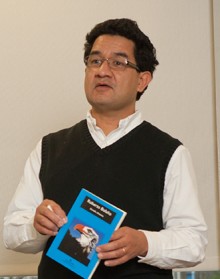Prize-winning pedagogy Prof. Ledezma wins “multimedia prize” from regional Latin American scholars conference
 Associate Professor of Hispanic Studies Domingo Ledezma was honored recently by the New England Council of Latin American Studies (NECLAS) for developing a digital publication on colonial Mexico that employs a combination of text, images and video.
Associate Professor of Hispanic Studies Domingo Ledezma was honored recently by the New England Council of Latin American Studies (NECLAS) for developing a digital publication on colonial Mexico that employs a combination of text, images and video.
The ebook “Colonial Mexico” written and edited by Professor Ledezma was awarded the conference’s “Best Multimedia” prize for the way in which it encourages readers’ “lively participation” in the subject matter.
“The resource itself takes advantage of multiple audiovisual components from the web, and displays rich visuals from various historical documents,” the council members wrote in presenting the award. “There are multiple ways to view and access the information in the Flipboard, making it quite exciting, even fun, to navigate.”
Ledezma created the publication as a model for students enrolled in his seminar on representations of Mexico from the time of the Aztecs through the Spanish colonial period. Following his lead, students in the class made their own ebooks, delving deeply into the history and culture of a part of the Hispanic world.
“I required the students to write texts in Spanish, to integrate high-resolution historical images that are part of the digital humanities resources that libraries have made available for public use, and to develop proficiency in ebook editing and publishing platforms,” he said.
The project not only encouraged students to read and understand primary source material in Spanish but also provided an opportunity to develop their skills in the use of digital publishing technologies and, Ledezma said, give them “a technological tool that they can use beyond graduation.”
“The process of creating a digital edition of texts like an e-book ensures that students have an in-depth experience with a text unlike most other experiences they have had in the humanities,” Ledezma said. “My innovative approach intends to offer students the venue to become critical consumers of technology and social media interaction.”
Other scholars of Hispanic literature and culture, however, praised Ledezma’s ebook as a source for both students and teachers.
“Included, for example, are multiple links that explain the indigenous manuscripts (codices), how they were made, how they can be read, and what images are represented,” the NECLAS prize committee reported. “One of the slides presents graphic images and their Nahuatl names. Overall this is an excellent resource to enhance a lecture or class on colonial Mexico, or to connect with multiple internet resources of Mexico’s rich historical documents.”
-
Categories:
- Hispanic Studies
- Latin American Studies